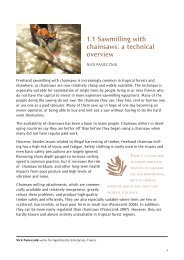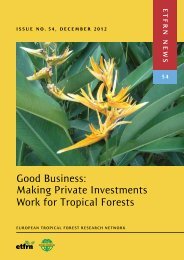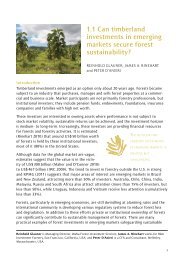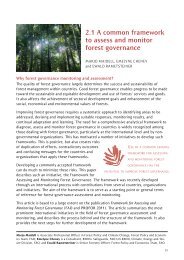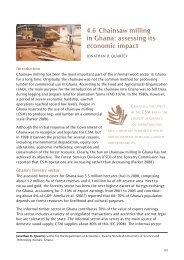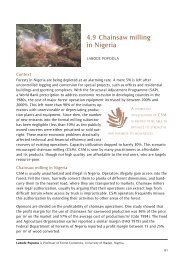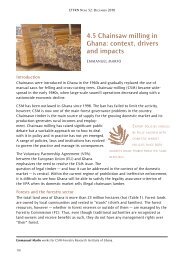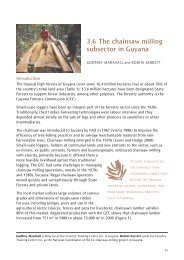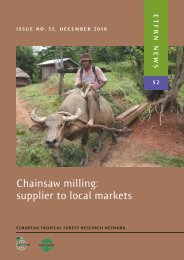Chainsaw milling: supplier to local markets - European Tropical ...
Chainsaw milling: supplier to local markets - European Tropical ...
Chainsaw milling: supplier to local markets - European Tropical ...
You also want an ePaper? Increase the reach of your titles
YUMPU automatically turns print PDFs into web optimized ePapers that Google loves.
142<br />
ETFRN NEws 52: DEcEmbER 2010<br />
conclusion<br />
in Cameroon, community forests were established <strong>to</strong> provide benefits from forest<br />
resources. however, CFas have experienced problems in gaining access <strong>to</strong> the forest,<br />
timber, benefits and external <strong>markets</strong>. Communities have often worked with small-scale<br />
chainsaw and portable sawmill opera<strong>to</strong>rs and these relationships are often unequal and<br />
fraught with conflict.<br />
support and capacity-building for communities engaged in establishing community forests<br />
are important. The level of support and education communities receive helps determine<br />
whether they will succeed. The most successful community forests are those near lomié,<br />
a pilot community forest area, where international donors provided intensive assistance<br />
and capacity-building during the early years of the community forest. as a result, the CFa<br />
members in this area seemed most aware of regulations,<br />
and had the best knowledge <strong>to</strong> negotiate labour and payment<br />
contracts. support <strong>to</strong> these communities also allowed<br />
one forest group <strong>to</strong> chose an alternative model based on<br />
self-reliance and capacity building, although they faced<br />
challenges in selling their product. some communities in<br />
south province also had some international help but it was<br />
less focused on education and training.<br />
The biggest challenge for the CFas is <strong>to</strong> be able <strong>to</strong> fell and<br />
produce timber and find a market for it. without the<br />
capacity <strong>to</strong> produce sawnwood and <strong>to</strong> sell it <strong>to</strong> the market,<br />
the benefits of the forests — at least from timber products — will remain limited. many<br />
large companies operating in Cameroon expressed an interest in buying timber from<br />
community forests but were reluctant <strong>to</strong> pursue relationships because of the lack of<br />
community capacity and uncertainty about what it would be like <strong>to</strong> work with the<br />
communities.<br />
several changes would help improve the Cameroon model of community forestry and<br />
provide more benefits for <strong>local</strong> residents:<br />
• The Government of Cameroon should simplify regulations and procedures <strong>to</strong> make it<br />
easier and less expensive for communities <strong>to</strong> form a CFa.<br />
• Civil society and donors should focus on education and capacity building so that<br />
communities are prepared <strong>to</strong> undertake activities themselves or <strong>to</strong> enter in<strong>to</strong> more<br />
equitable relationships with opera<strong>to</strong>rs.<br />
• Donors and companies should place more emphasis on analyzing the timber value<br />
chains and market possibilities <strong>to</strong> assist CFas in obtaining access <strong>to</strong> timber <strong>markets</strong><br />
and revenue from selling their timber.<br />
• purchasers of timber — both domestic and international — should engage with CFas<br />
<strong>to</strong> ensure that any timber entering the market from these forests meets appropriate<br />
standards and benefits the residents of the forests.



